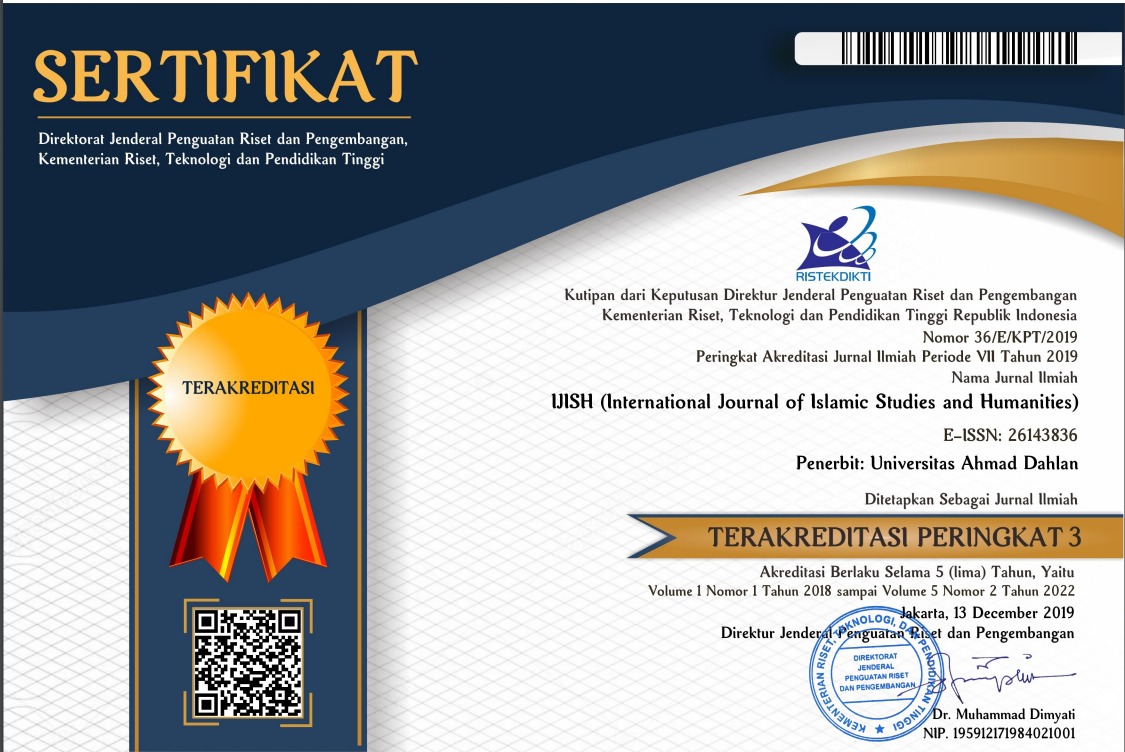Accountability of Performance Integrated With the Value of Islamic Civilization: The Case of Muhammadiyah University of Makassar
DOI:
https://doi.org/10.26555/ijish.v2i2.881Keywords:
Muhammadiyah, Accountability, Performance, SincerityAbstract
The objective of this research is to describe accountability of performance integrated with the value of Islamic civilization and find the essence from framework of Islamic accountability of organization. This research is qualitative type using interpretive spiritualism paradigm under ethnomethodology approach. The object of this research is Muhammadiyah University of Makassar and informants are people involved in making a decision in the university. The result reveals that the accountability in Muhammadiyah University of Makassar is built using the religious spiritualism under a foundation of Islamic values consisting of ukhuwah and sincerity, amanah, oriented goal, effectiveness and efficiency, opennes, and consistency. The further result discloses that sincerity is the strongest value to build the accountability of performanceReferences
al-Qur’an and al-Karim
Affandi, A. (2014). Makna Pembiayaan Salam Perspektif Perbankan Syariah dan Petani di Probolinggo. Jurnal Ilmiah Mahasiswa Fakultas Ekonomi dan Bisnis Universitas Brawijaya 2(2).
Amerieska, S., G., Irianto, S. P. Affandy. (2012). Akuntabilitas pada Baitul Maal Wat Tamwil Ditinjau dari Perspektif Sharia Enterprise Theory. Jurnal Ekonomi dan Keuangan Islam, 2(1): 27-39.
Arafah, M., Budira, and Suarni. (2018). Gerakan Dakwah Kultural dalam Mewujudkan Masyarakat Berperadaban dalam Perspektif Muhammadiyah. Prosiding Konferensi Nasional ke-7, APPPTMA.
Coulon, A. (1995). Ethnometodology. Sage Publications, Inc. SAGE Research Methods.
Dananjaya, H. (2014). Membumikan Tauhid Sosial Ala Amien Rais. http://sangpencerah.id/2014/04/membumikan-tauhid-sosial-ala-amien-rais.html. Accessed April 2016.
Denzin, N.K., and Lincoln, Y. S. (2009). Handbook of Qualitative Research (terjemahan).
Affandi, A. (2014). Makna Pembiayaan Salam Perspektif Perbankan Syariah dan Petani di Probolinggo. Jurnal Ilmiah Mahasiswa Fakultas Ekonomi dan Bisnis Universitas Brawijaya 2(2).
Amerieska, S., G., Irianto, S. P. Affandy. (2012). Akuntabilitas pada Baitul Maal Wat Tamwil Ditinjau dari Perspektif Sharia Enterprise Theory. Jurnal Ekonomi dan Keuangan Islam, 2(1): 27-39.
Arafah, M., Budira, and Suarni. (2018). Gerakan Dakwah Kultural dalam Mewujudkan Masyarakat Berperadaban dalam Perspektif Muhammadiyah. Prosiding Konferensi Nasional ke-7, APPPTMA.
Coulon, A. (1995). Ethnometodology. Sage Publications, Inc. SAGE Research Methods.
Dananjaya, H. (2014). Membumikan Tauhid Sosial Ala Amien Rais. http://sangpencerah.id/2014/04/membumikan-tauhid-sosial-ala-amien-rais.html. Accessed April 2016.
Denzin, N.K., and Lincoln, Y. S. (2009). Handbook of Qualitative Research (terjemahan).
Downloads
Published
2019-10-15
How to Cite
Rayyani, W. O., Abbas, A., & Hannani, H. (2019). Accountability of Performance Integrated With the Value of Islamic Civilization: The Case of Muhammadiyah University of Makassar. IJISH (International Journal of Islamic Studies and Humanities), 2(2), 71–80. https://doi.org/10.26555/ijish.v2i2.881
Issue
Section
Articles
License
Authors who publish with IJISH (International Journal of Islamic Studies and Humanities) agree to the following terms:
- Authors retain copyright and grant the journal right of first publication with the work simultaneously licensed under a Creative Commons Attribution License (CC BY-SA 4.0) that allows others to share the work with an acknowledgment of the work's authorship and initial publication in this journal.Â
- Authors are able to enter into separate, additional contractual arrangements for the non-exclusive distribution of the journal's published version of the work (e.g., post it to an institutional repository or publish it in a book), with an acknowledgment of its initial publication in this journal.
- Authors are permitted and encouraged to post their work online (e.g., in institutional repositories or on their website) prior to and during the submission process, as it can lead to productive exchanges, as well as earlier and greater citation of published work.

This work is licensed under a Creative Commons Attribution-ShareAlike 4.0 International License.






